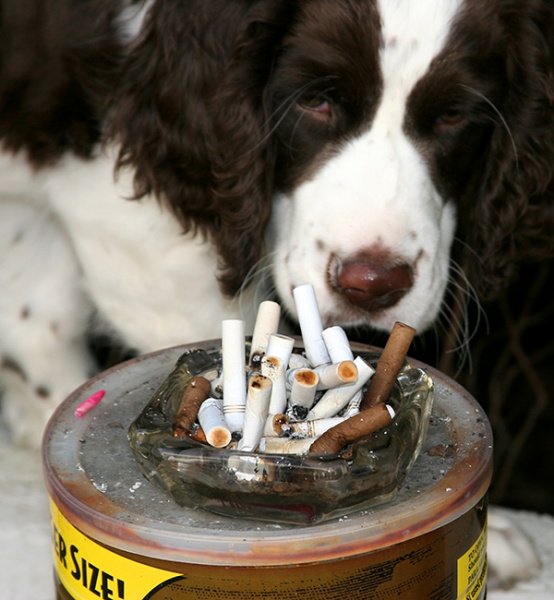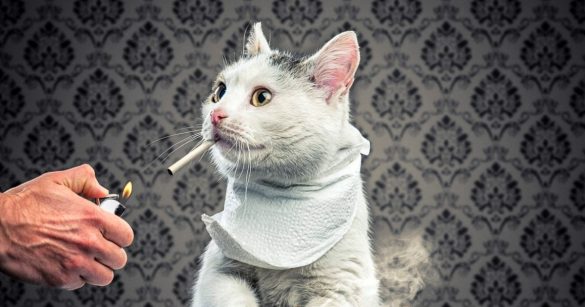Are you aware of the effects of smoking on our pets? The effects of smoking are not just confined to humans.
Even animals are at risk of negative health effects from second hand smoke. Toxins found in tobacco smoke such as ammonia, Arsenic, Benzene, CO, etc, damage cells and even organs in dogs and cats.
People are well aware of the potential health risks smoking invites to their lives. Smoking not only affects the person who inhales but also to people and pets surrounding them.
Second-hand smoking or passive smoking is even deadlier than direct smoking which most people fail to realize and are ignorant about.
This article discusses if cats and dogs get second hand smoke. In addition, it also talks about the effects and effective prevention methods.
Content Table
What is Second Hand Smoking?
Second-hand smoking occurs when you breathe in another person’s tobacco smoke. Smoke breathed out by a smoker contains all the harmful toxins coming from burnt-out nicotine.
Exposure to second-hand smoking damages the body of cats and dogs in multiple ways. It increases the risks of respiratory illness and even lung cancer. Second-hand smoking worsens the existing breathing problems and adds up more to the list.
Can Cats and Dogs get Second Hand Smoke?
Yes, cats and dogs get second hand smoke. Second-hand smoking directly affects your pets like cats, dogs, and even birds. As owners puff their smoke away, they release harmful chemicals in the air circulating in the environment putting their pets at a greater health risk.
Pets are an important part of our lives. We allow them into our lives hence it’s our responsibility to protect and give them a safe environment.

Second hand smoking in most cases can produce deadlier effects than active smoking itself. Even minimal exposure can be life-threatening in some pets with health conditions.
Effects of Second-Hand Smoking on Dogs
Lung Diseases
After second-hand smoking, dogs can experience changes in their respiratory airways and respiratory tracts. Alveolar macrophages (AMs) are lung cells that are responsible for lung immunity in dogs.
They work as a defense mechanism against anything abnormal detected in the air and safeguard the lungs from infections of every sort. AMs detect the harmful toxins in the air and they phagocytize, or “eat,” it to eliminate them from the system.
Dogs exposed to second-hand smoking are more likely to have an increased number of alveolar macrophages containing black smoke particles making them more prone to lung diseases. Dogs with longer snouts are more likely to develop tumors around their nose.

Cases have shown that second-hand smoking is the major cause of bronchitis in dogs. Short and medium-nosed dogs have a greater risk of lung cancer as their nose cannot filter the toxins from the air and directly transfer them into their lungs.
The ultra-fine particles directly move into the lungs increasing the risk of lung cancer.
Other Health Risks
Pets living with owners who are used to smoking are exposed to health risks such as eye infection, respiratory issues, chronic coughing, and even lung cancer. Dogs and cats have a better sense of smell than humans.
Hence, they are prone to more side effects. Smelling smoke can be more infectious and irritating to dogs in comparison to humans as they have a stronger sense of smell.
Effect of Second-Hand Smoking on Cats
Asthma and Cancer
Cats living in an atmosphere surrounded by smoke develop asthma and chronic lung diseases. Lymphoma, the cancer of lymph nodes is a common case in cats exposed to second-hand smoking.
The furs of cats accumulate harmful particles from the air and cats tend to develop oral cancer from the frequent licking of their fur called oral squamous cell carcinoma. Well, this might sound scary and deadly at the same time, but this can also be a motivation for people willing to smoke and are living with pets.

But it’s not easy for people to put down their cigarettes.
Nicotine poisoning
Even a small dose of nicotine is fatal. Not just only second-hand smoking but if you’re careless about proper litter disposing of cigarettes can put the life of your cat at risk.
Chewing on cigarettes may cause nicotine poisoning and even choking which might invite the untimely death of your pet. Proper disposal of cigarettes is crucial if you’re living with pets at your place.
What can you do to protect your pets?
Quit!
There can’t be a better choice than quitting smoking. This eliminates the need to think about the matter anymore or even read this article further. While exploring secondary options, these are the safety protocols you can follow to lower the risks.
Take a Break from Smoking
If quitting smoking sounds like a big deal, you can take a smoke break for some time. Usually, it is the first step that holds you back from achieving your goal.
Thus, if you decided to take a short break from smoking, you might never return to the habit again.
Boundaries
Avoid smoking inside the house with pets. Even if you don’t want to go on a hiatus, you can always lower the frequency of your smoke consumption. You can do this by setting creative boundaries with yourself.
For example, make a decision to only smoke when you are outside the house. This will not only reduce your cigarette consumption but also keep your pets safe.
Proper ventilation
Say you are a heavy smoker and didn’t like any of the methods mentioned above. Maybe you really want to co-exist with smoking and your pets. Then, using proper ventilation in the house can be the solution to keep your pets away from secondhand smoke. Open all the windows to allow the channel to remove the smoke residue.
Smoke Filter
Use a proper smoke filter to prevent harmful toxins releasing in the environment. This will ensure that your pet doesn’t inhale too much of the residual gases from second-hand smoking.
Vaporizers or Electronic Cigarettes
E-cigarettes and vaporizers are relatively healthier than the actual nicotine product. This can reduce the risk of inhalation of harmful chemicals via air. That said, we strictly discourage any forms of smoking be it a cigarette or a vape.
Conclusion
Since dogs and cats are susceptible to secondhand smoke, it is a very bad idea to smoke around them. Instead, you should also look for ways to eliminate the smoking habit.
A study conducted at the HFHS demonstrated that 28.4% of smokers claimed to try to stop smoking after educating themselves on the effects of secondhand smoke on their pets’ health. While smoking you’re not just putting yourself at risk but also everyone around you has a price to pay. Thus, our pets can encourage us to reduce smoking or even stop it completely.

